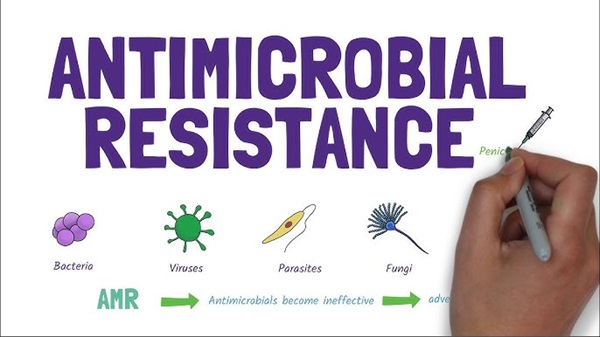
Health stakeholders have called for urgent collaboration with the private sector to close the gap between Nigeria’s national Antimicrobial Resistance (AMR) policies and real-world implementation, warning that continued inaction could severely undermine public health gains and increase mortality.
This call came during a high-level dialogue at the World Health Expo Lagos (WHXLagos) on Tuesday. Experts and public health officials used the forum to highlight the pressing need for regulation, data sharing, and coordinated antimicrobial stewardship to curb what they described as a “silent pandemic.”
Head of disease prevention at the Nigeria Centre for Disease Control and Prevention (NCDC), Dr. Tochi Okwor said that Nigeria has made bold global commitments to address AMR, including at the United Nations General Assembly. However, she warned that these commitments must now be matched with tangible, context-specific actions that include the private sector.
“We must begin to tell the story, co-create, and bring the private sector to the table – not just to be seen, but to shape the solution,” she said.
Okwor emphasised that while the private sector delivers the majority of healthcare in Nigeria, its role in implementing AMR strategies remains limited. She noted that a significant volume of AMR-related data lies untapped within private health facilities, laboratories, and pharmaceutical supply chains.
“There is a huge opportunity in aligning incentives with national goals. We must move from fragmented responses to a data-driven, stewardship-based model,” she added.
Deputy director of strategy and new business at Nigeria Health Watch, Dr. Adachi Ekeh presented insights from community listening sessions. She underscored that AMR extends beyond clinical settings into homes and marketplaces, where antibiotics are commonly misused.
“Practices like reusing leftover antibiotics, stockpiling and sharing medicines with others are alarmingly frequent,” Ekeh said. “Nearly half of the people we engaged keep antibiotics at home, even when no one is ill.”
She called for community-focused education campaigns to accompany regulation, warning that public understanding of AMR remains dangerously low.
Deputy director of the food and chemical laboratory at the National Agency for Food and Drug Administration and Control (NAFDAC), Dr. Tunde Sigbeku said that Nigeria already has the legal instruments needed to fight AMR—including a prequalified drug law – but enforcement remains a key challenge.
“Our problem isn’t the absence of laws; it’s weak enforcement, especially in the sprawling informal drug market,” he said. “The private sector must see itself as part of the solution – driven not only by profit but also by stewardship.”
Sigbeku advocated for stronger public-private partnerships to track antimicrobial supply chains in real-time and eliminate substandard or counterfeit medicines from circulation.
Speaking from the veterinary health perspective, director of bacteriology, parasitology and virology at the National Veterinary Research Institute (NVRI), Dr. Sati Ndulukun highlighted the growing contribution of the agriculture and animal husbandry sector to resistance.
“A large proportion of antibiotics in Nigeria are used in livestock and aquaculture. We urgently need better regulation and diagnostic capacity in the animal health sector,” Ndulukun said. He also urged for regional collaboration to scale up innovations in veterinary diagnostics and harmonise data collection across the human-animal-environment interface.
Bringing a behavioural perspective to the issue, Estelle Mbadiwe, a pharmacist with Ducit Blue Solutions, said AMR’s “invisibility” in the public discourse is due in part to poor data visibility and weak public engagement.
“We need the private sector to help move AMR from silence to a scream. It must become part of the public consciousness,” she said. Mbadiwe added that youth engagement, strengthened supply chains, and creative cross-sector collaboration would be key to amplifying awareness.
Director of pharmacy practice at the Pharmacists Council of Nigeria (PCN), Dr. Thomas Ilupeju noted that for many Nigerians, pharmacies and patent medicine vendors (PMVs) are often their first – and only – point of contact with the healthcare system.
“While AMR education is now part of pharmacy curricula, we must go further. We need to reform how drugs are distributed and address open drug markets that fuel indiscriminate access,” Ilupeju said.
As Nigeria rolls out its second National Action Plan on AMR (NAP 2.0), experts warned that without strategic and structured inclusion of the private sector, spanning human, animal and environmental health, the country risks falling behind in its fight against drug-resistant infections.
Science Nigeria reports that AMR arises when bacteria, viruses, fungi, and parasites evolve to resist the medicines designed to kill them. This makes infections harder – and in some cases impossible – to treat, resulting in prolonged illness, greater healthcare costs and increased risk of death.
In 2019, AMR was responsible for more than 263,000 deaths in Nigeria – more than the combined toll of malaria and tuberculosis. Key drivers include antibiotic overuse and misuse in both humans and animals, poor infection control practices, weak regulation enforcement and widespread public self-medication.
Stakeholders agree that curbing AMR in Nigeria requires adopting a One Health approach – an integrated model that connects human, veterinary, agricultural, and environmental sectors. In this framework, the private sector – which delivers over 60 percent of health services in Nigeria, is not only vital but indispensable to success.

